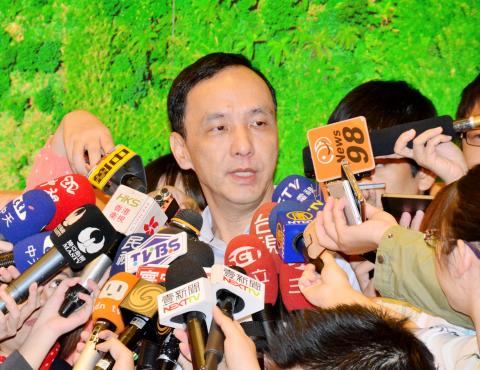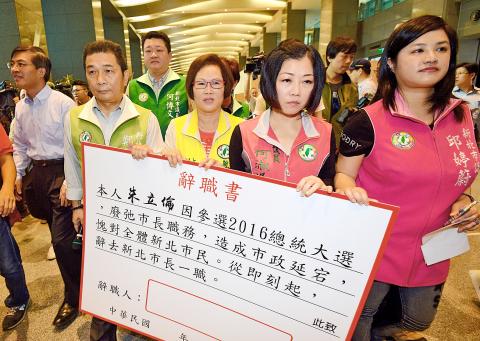Newly nominated Chinese Nationalist Party (KMT) presidential candidate Eric Chu (朱立倫) yesterday said he would take a three-month leave of absence from his job as New Taipei City mayor, starting today, to focus on his campaign.
New Taipei City Deputy Mayor Hou You-yi (侯友宜) will stand in for Chu during his absence.
Chu, who is only 10 months into his second four-year term, made the announcement after a meeting of the New Taipei City Council in the morning, which had been brought ahead from today.

Photo: CNA
“I was nominated on Saturday to represent the KMT in next year’s presidential election, for which I must apologize to every resident of the city because I had pledged on more than one occasion that I would not join the race,” Chu said.
“It is a painful, but necessary decision that needed to be made at such a critical moment,” he said.
Chu’s decision to throw his hat into the ring for the Jan. 16 presidential election has triggered a wave of criticism from the public and some inside the KMT, largely because of his oft-repeated promise to serve out his term as mayor.

Photo: Lo Pei-der, Taipei Times
Democratic Progressive Party (DPP) Legislator Tuan Yi-kang’s (段宜康) on Sept. 26 estimated that Chu had made the promise 24 times between June last year and May.
Chu, who also serves as KMT chairman, said a presidential election concerns a nation’s future and its major policies, and that he must take on the responsibility of offering the public a healthier democracy.
Given the nearness of the election, Chu said he had asked his administrative officials to stand fast at their posts and work as a team.
“During this interim period, Deputy Mayor Hou will face a heavy workload, but my administration is confident of its ability to go a good job governing the municipality,” Chu said.
He said he would remain in close contact with his team through various channels, including mobile messaging app Line.
If elected president, he plans to expand many of his successful policies and experiences as mayor on a nationwide scale, Chu said.
“I also plan to bring the resources of the central government back to the city,” he added.
In a move to defuse criticism about his decision to enter the presidential race without stepping down as mayor, Chu said it is customary, at home and abroad, for politicians to run for new offices without resigning from their current posts.
“It is my belief that as long as a candidate’s team is capable of doing a good job, there is no reason why he cannot maintain stability in the city and continue to strive for the betterment of his city,” Chu said.
New Taipei City Government Information Department Director Lin Chieh-yu (林芥佑) said Chu decided not to accept a salary during his leave of absence.
“An estimated NT$570,000 due the mayor over the next three months is to be donated to the city government’s coffers,” Lin said.

SECURITY: As China is ‘reshaping’ Hong Kong’s population, Taiwan must raise the eligibility threshold for applications from Hong Kongers, Chiu Chui-cheng said When Hong Kong and Macau citizens apply for residency in Taiwan, it would be under a new category that includes a “national security observation period,” Mainland Affairs Council (MAC) Minister Chiu Chui-cheng (邱垂正) said yesterday. President William Lai (賴清德) on March 13 announced 17 strategies to counter China’s aggression toward Taiwan, including incorporating national security considerations into the review process for residency applications from Hong Kong and Macau citizens. The situation in Hong Kong is constantly changing, Chiu said to media yesterday on the sidelines of the Taipei Technology Run hosted by the Taipei Neihu Technology Park Development Association. With

CARROT AND STICK: While unrelenting in its military threats, China attracted nearly 40,000 Taiwanese to over 400 business events last year Nearly 40,000 Taiwanese last year joined industry events in China, such as conferences and trade fairs, supported by the Chinese government, a study showed yesterday, as Beijing ramps up a charm offensive toward Taipei alongside military pressure. China has long taken a carrot-and-stick approach to Taiwan, threatening it with the prospect of military action while reaching out to those it believes are amenable to Beijing’s point of view. Taiwanese security officials are wary of what they see as Beijing’s influence campaigns to sway public opinion after Taipei and Beijing gradually resumed travel links halted by the COVID-19 pandemic, but the scale of

A US Marine Corps regiment equipped with Naval Strike Missiles (NSM) is set to participate in the upcoming Balikatan 25 exercise in the Luzon Strait, marking the system’s first-ever deployment in the Philippines. US and Philippine officials have separately confirmed that the Navy Marine Expeditionary Ship Interdiction System (NMESIS) — the mobile launch platform for the Naval Strike Missile — would take part in the joint exercise. The missiles are being deployed to “a strategic first island chain chokepoint” in the waters between Taiwan proper and the Philippines, US-based Naval News reported. “The Luzon Strait and Bashi Channel represent a critical access

Pope Francis is be laid to rest on Saturday after lying in state for three days in St Peter’s Basilica, where the faithful are expected to flock to pay their respects to history’s first Latin American pontiff. The cardinals met yesterday in the Vatican’s synod hall to chart the next steps before a conclave begins to choose Francis’ successor, as condolences poured in from around the world. According to current norms, the conclave must begin between May 5 and 10. The cardinals set the funeral for Saturday at 10am in St Peter’s Square, to be celebrated by the dean of the College